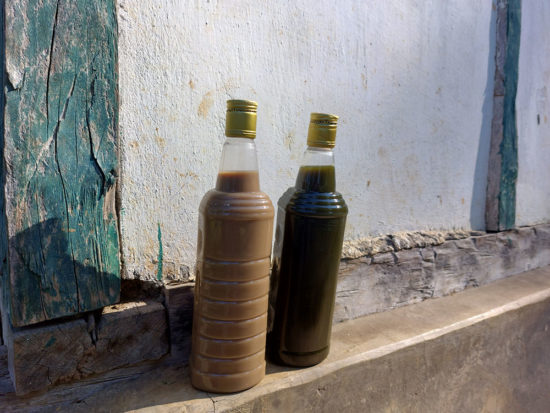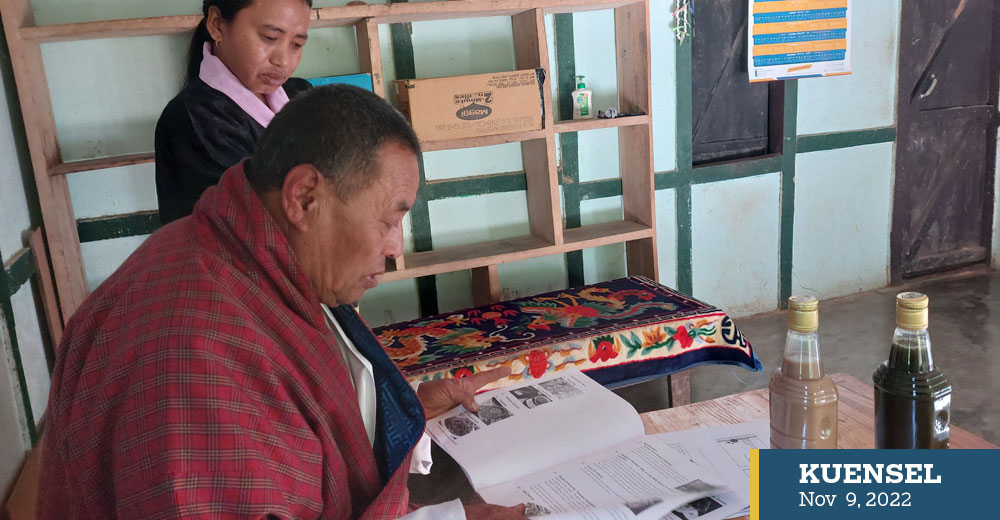Choki Wangmo | Tsirang
Pelrithang, Tsirang—no processing firm, no fancy equipment, not even crowds of people.
This is a silent house where Dumbari Alley and her father Prati Man Alley practice herbal medicine.
The herbalists, known as “Baidey” in Lhotsham, have been practicing the craft for many generations. Believed to be revealed in Prati Man Alley’s great grandfather’s vision, the herbal medicine practice is a sacred family heirloom, a knowledge passed down for generations.
“We are not allowed to share the ingredients and procedures,” said the 65-year-old herbalist who lives just below the Damphu Central School’s football ground.
Prati Man Alley is a botanist. He can identify more than 500 herbal medicines and can name them in Lhotsam and other dialects.
Prati Man Alley grew up herding sheep with his grandfather who taught him how to identify plants.
“It takes years of observation and expertise. It is risky. One has to see if insects or other wild animals feed on certain plants. If they avoid them, it means humans can’t eat the plants,” said the herbalist.
After working in Thimphu with a corporate office for two decades, he returned to his village. “I used to practice even in Thimphu but the plants weren’t always available.”
After 35 years of active practice and rigorous training, Prati Man Alley is confident to hand over the art to the next generation.

Dumbari’s hearing impairment has not challenged her from learning. She is a plant expert too.
The process is tedious, collecting the herbs, grinding in a pestle, sieving with cloth pieces, and collecting liquid medicine. Easy access to raw materials is challenging.
The duo makes potions to treat snake or scorpion bites, tonsilitis, mumps, gastric ulcer, diabetes, pneumonia, fractures, and cuts, among others. Three key plants are used, mostly herbs and climbers from the wild, either dried or used in raw form.
In 1992, His Royal Highness Prince Namgay Wangchuck awarded a letter of recognition to Prati Man’s father Bhim Bdhr Alley for treating a snake bite.
Since then, the family was allowed to collect medicinal plants of five tonnes a year to prepare indigenous medicines at his home. “It is only for making medicines for the use by local people and not for sale in the form of raw materials,” it stated.
They give away the medicines to locals and some patients for free. “Elderly people and low-income groups cannot pay. Some people give us fees but we don’t charge money,” Prati Man said.
In a year, the duo gets 600 and 1,000 patients. Patients come as far as Bumthang to seek treatment. However, in case of severe problems, Prati Man refers them to hospitals.
“We just give herbal medicines. We don’t try to diagnose and treat them like doctors,” he added.
Some patients after hearing about the medicines, he said, directly order it instead of clearly explaining their ailments.
The duo is in the constant process of researching and experimenting with plants. They are in need of processing equipment and facilities including packaging. The medicines are currently stored in recycled bottles. If the medicines can be produced in large quantities, he said that there are opportunities for access and benefit sharing among communities. “It would encourage traditional knowledge practitioners.”
“There is a need for scientific validation. We need support to ensure that this indigenous art doesn’t die a slow death,” Prati Man said. He is also trying to domesticate the herbal plants. “We need to conserve raw materials with research in domestication.”
People, he said, have confidence in traditional medicine. “Working closely with communities, we are able to treat some mild illnesses that would reduce the burden on our health system.”
Prati Man’s wife and three other children are also adept in using plants to treat ailments. However, they live in towns. Without a child of Dumbari’s, Prati Man is worried about continuing the practice in the future. “It is a dying art.”
“Traditional knowledge is precious; it has to be preserved,” he added.


